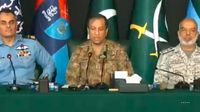In a significant escalation of hostilities between India and Pakistan, Sheikh Zayed International Airport in Rahim Yar Khan was partially damaged during an Indian airstrike on Saturday morning, May 10, 2025. This attack is viewed as a direct assault on the longstanding friendship between Pakistan and the United Arab Emirates (UAE), as the airport, constructed in 1993, is named after Sheikh Zayed bin Sultan Al Nahyan, the founding father of the UAE.
The Indian Air Force's strike on the airport followed an earlier attempt to target Nankana Sahib, a site of religious importance for the Sikh community. Reports indicated that the Indian planes aimed to disrupt not only military but also civilian infrastructure, raising concerns about the implications for regional stability.
According to reports from 24NewsHD, the attack on Sheikh Zayed International Airport caused damage to the facility's basic infrastructure, temporarily disrupting regular flights. Fortunately, no casualties were reported in either incident, including a separate drone crash that occurred in the airport's parking area.
Pakistan's Defense Minister, Khawaja Asif, condemned the attack, labeling it a "cowardly response" and emphasizing that the country is prepared for heightened confrontation should hostilities continue to escalate. In a televised interview, he stated, "We cannot rule out the possibility of escalation. If it happens, we are ready. However, we will not let our guard down." He further warned that a war between two nuclear powers poses alarming risks not just for the region but for the entire world.
In retaliation for the attacks, Pakistan launched a large-scale operation dubbed "Operation Bunyan Marsoos," targeting key Indian military installations. Reports indicate that Pakistani forces struck Udhampur and Pathankot airbases, destroyed a BrahMos missile storage facility, and neutralized an Indian Army brigade headquarters. Additionally, cyber units from Pakistan claimed to have disrupted 70% of India's national power grid and hacked multiple government and military websites, significantly affecting communications and utilities.
The military tensions were further exacerbated by Pakistan's claims that three of its air bases—Nur Khan, Murid, and Rafiqui—were also targeted by Indian missiles and drones. Lt Gen Ahmad Sharif Chaudhry, a spokesperson for the Pakistan military, confirmed that while Indian air-to-surface missiles were fired, all assets of the Pakistan Air Force remained safe.
As part of the ongoing military confrontation, Pakistan's airspace was temporarily closed for all kinds of air traffic, a move reflecting the heightened state of alert. Prime Minister Shehbaz Sharif convened a meeting of the National Command Authority to discuss the national security implications of these attacks.
The history of Sheikh Zayed International Airport is intertwined with the diplomatic relations between Pakistan and the UAE. Over the years, the airport has served as a vital hub for both civilian and military operations, hosting various Pakistan Air Force assets, including fighter jets and unmanned aerial vehicles. The airport's strategic location, just southwest of Rahim Yar Khan, places it in proximity to the border with India's Rajasthan state, making it a critical point for military logistics.
In the wake of the recent attacks, the international community is watching closely. The escalating conflict raises concerns about the potential for further military actions and the broader implications for regional security. Analysts warn that continued aggression from either side could lead to a full-scale conflict, with devastating consequences.
As tensions rise, both nations have engaged in a war of words, with accusations flying back and forth. India has denied targeting civilian infrastructure, while Pakistani officials have condemned the strikes as reckless and shameful. This ongoing cycle of violence and retaliation underscores the fragile state of relations between the two nuclear-armed neighbors, who have a long history of conflict.
In conclusion, the situation remains fluid, with both sides poised for further military action. As Pakistan prepares for possible escalation, the international community is urged to intervene and seek a peaceful resolution to prevent a catastrophic outcome.






